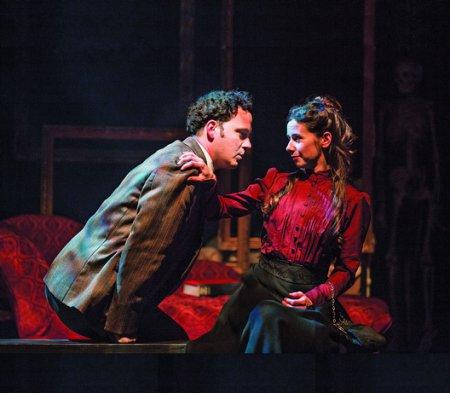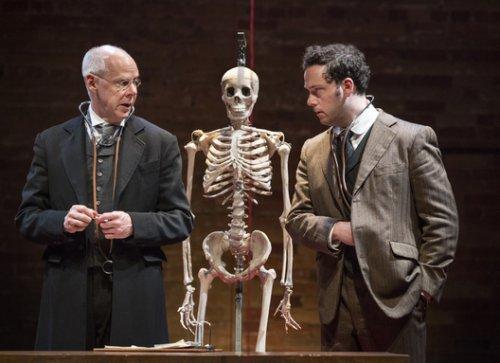Of Human Bondage
Epic staging of the famed W. Somerset Maugham autobiographical novel about a London medical student who falls in love with a lower class heartbreaker.

Gregory Prest as Philip Carey and Michelle Monteith as Mildred Rogers in a scene from Soulpepper Theatre Company’s production of “Of Human Bondage” (Photo credit: Cylla Von Tiedemann)
[avatar user=”Victor Gluck” size=”96″ align=”left” ] Victor Gluck, Editor-in-Chief[/avatar]Although Of Human Bondage, W. Somerset Maugham’s best-selling 1915 novel about sexual obsession and the pursuit of love and fulfillment, has been filmed three times (the first version making a star of Bette Davis), it has never until now been made into a stage play, possibly due to its prodigious length of 728 pages. As part of “Soulpepper on 42nd Street,” a four-week festival of award-winning work from the Toronto-based Soulpepper Theatre Company, Vern Thiessen’s stage adaptation is now playing in New York at The Pershing Square Signature Center. One of nine theater productions and three concerts brought by the theater company, Of Human Bondage at two hours and 40 minutes (including intermission) and 14 named characters played by 12 actors is epic theater.
Using pretty much the same framework as the three movie versions which also skip the hero’s childhood, Thiessen’s adaptation of this story set in the late 1890’s, begins with self-effacing Philip Carey attempting to qualify as a doctor at a medical training program at London’s St. Luke’s Hospital under the starchy Dr. Tyrell. The retiring Philip, who was born with a club foot that he is very self-conscious about, previously studied to be a painter in Paris but gave it up when he realized he was only proficient, not inspired.
Going out to tea with a rather naïve and unsophisticated colleague Dunsford, Philip meets lower class waitress Mildred Rogers who has champagne tastes and is a world-class flirt. Although she allows him to take her out and spend money he cannot afford to lose, she shows him no affection. Totally obsessed with her, Philip has so damaged an ego from his disability that he thinks no woman can love him. His grades suffer from his inability to study under Mildred’s malevolent influence.

Gregory Prest, Sarah Wilson, Raquel Duffy, Courtney Ch’ng Lancaster and Jeff Lillico in a scene from Soulpepper Theatre Company’s production of “Of Human Bondage” (Photo credit: Cylla Von Tiedemann)
Just as he is about to propose marriage, Mildred informs him that she is marrying one of her other customers, the German merchant Miller. Freed from his obsession with Mildred he begins a relationship with steady romance novelist Norah Nesbit which restores Philip’s confidence. However, Mildred reappears in his life several times, each time descending the social ladder another rung, and each time affecting his studies. When he meets Thorpe Athelney, an eccentric elderly patient at a clinic at which he works, he becomes a friend of the family and the love object of the youngest daughter Sally. Though Philip knows that Sally is better for him than Mildred, he cannot get over his obsession. Mildred, who knows how to play on his emotions, continues to drag Philip down so that he is unable to free himself from her until their final showdown. Two subplots deal with Philip’s seeming friend and medical colleague Griffiths who cuts every corner and runs through women like tissue paper, and the fate of his artistic friends from Paris, painter Lawson and poet Cronshaw who becomes addicted to absinthe.
Director Albert Schultz’s program note explains that the production set itself two challenges: first, that Philip Carey would never leave the 16-foot red square center stage, and that all of the sounds (vocal, musical or atmospheric) would be made by the 11 other actors in view of the audience. This may have made for an interesting artistic experiment, but it is not so effective for the audience. While the 16-foot square makes the play claustrophobic (a metaphor for Philip’s life), it also means that scenery has to be carted around for each and every scene. Nevertheless, in Lorenzo Savoini’s clever set design, the transitions between the many scenes are smooth and flowing. The sound effects made by the actors on stage ultimately become very distracting from the action of the play. Faithful to the novel but necessarily telescoped, Thiessen’s adaptation is fragmented into a series of vignettes which though not disjointed suggest that much is missing.

Oliver Dennis as Dr. Tyrell and Gregory Prest as Philip Carey in a scene from Soulpepper Theatre Company’s production of “Of Human Bondage” (Photo credit: Cylla Von Tiedemann)
Although the story is compelling, the leads are less than perfectly cast. As the unassuming and diffident Philip, Gregory Prest is very bland, exhibiting no charisma, almost a cipher to be played on by Mildred. Played previously by Leslie Howard, Paul Henried and Laurence Harvey, their solution for the problem of Philip was to count on their personal charm which Prest fails to do. He also makes his limp much more pronounced than it needs to be. While Michelle Monteith’s Mildred is both arrogant and supercilious, she is too much a lady to be Maugham’s sluttish waitress. Other than sliding down the social ladder, she doesn’t seem much different at the end than when we first meet her.
Under the direction of Schultz, who is also Soulpepper’s founding artistic director, the rest of the cast who are seen in multiple roles are much more successful, creating immediately recognizable, three-dimensional characters. Jeff Lillico’s Griffiths is a cool deceiver as the false friend with the morals of a snake. Paolo Santalucia makes the ethical medical student Dunsford a sympathetic character.
Sarah Wilson’s Norah Nesbit is a very efficient and self-possessed career woman, a steadying force in Philip’s life. As Sally Athelney, the dutiful daughter with a mind of her own, Courtney Ch’ng Lancaster is both sweet and charming. We ultimately hope that Philip will end up with her.
As her father Thorpe Athelney, John Jarvis is quite amusing as a dyed-in-the-wool eccentric, while his stockbroker MacAlister is a sly conniver. As the two British friends from Paris, Stuart Hughes and Oliver Dennis suggest these artists are much more world weary and experienced than their lines actually demonstrate. Dennis is also fine as the rigid and straitlaced Dr. Tyrell, Philip’s medical professor and mentor. In her brief portrait as a London musical star, Raquel Duffy immediately brings to bear the authority of stardom. Duffy, Lancaster, and Wilson are also cleverly used as the semi-clothed “portraits” (sitting behind gold frames) that Philip has brought back as mementos from his Paris life to decorate his rooms. The entire cast is beautifully dressed by Erika Connor in a variety of late Victorian styles, mirroring their social position. Mike Ross’ original music and sound design is much in evidence throughout the play.
While the power of W. Somerset Maugham’s legendary story is still much in evidence, Soulpepper’s elaborate staging for Of Human Bondage dilutes its effectiveness. Lacking in sexual heat, what the stage performance may do is send you back to the original novel, not a bad thing.
Of Human Bondage (in repertory through July 26, 2017)
Soulpepper on 42nd Street
Soulpepper Theatre Company (Toronto) at The Pershing Square Signature Center, 480 W. 42nd Street, in Manhattan
For tickets, call 1-888-898-1188 or visit http://www.Soulpepper.org
Running time: two hours and 40 minutes with one intermission






I saw the movie “Of Human Bondage”, last night on 6/11/2018, that starred Betty Davis and what a great story. The performances by the guy who played Phillip and Ms. Davis was superb. I love any movie that Betty Davis plays she was a fantastic and phenominal actress. I enjoy watching her talents go to work. As they have always said and I quote “there goes Betty Davis eyes. There is none like hers. She is the greatest actress that ever was.